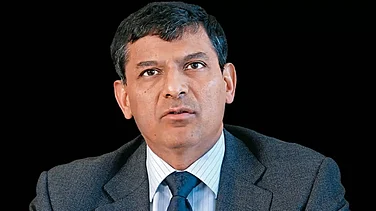Like the two tuskers sizing each other up in its logo, the management of gold-financing giant Muthoot Finance and its emplo-yees union have been in a stand-off for over a month in Kerala. Since August 20, the Muthoot Fina-nce Employees Union (MFEU) has been on a state-wide strike against “anti--labour practices” such as -unfair salary structure, lack of -increments, excessive pay-docking, cuts in incentives, punitive transfers and arbitrary suspensions. More than 300 branches remain shutt-ered—over half the presence of non-banking fin-ancial companies in Kerala. Muthoot’s management and a section of the employees claim, however, that “vested interests” are preventing a majority of its roughly 3,000-strong workforce in the state from working. The company has hit back by closing down some 45 branches citing “non- performance”. It has even thr-ea-tened to wind up -all operations in its home state.
Muthoot Finance In Jumbo Mess As Warring Workers Seek Their Dues
Muthoot faces protest for anti-labour practices as workers allege that company spends big in IPL and on Bollywood stars but treats staff shabbily

Head-load workers stand in solidarity with white-collar workers, raising the battle cries of working-class struggle, and the police have been roped in since the Kerala High Court’s order to remove impediments to work. Pro-testers say the reluctance of the country’s largest gold-funding corporate (in terms of loan portfolio) to provide a fair wage is pathetic.
“Why can’t a company that earned over Rs 2,000 crore in profit last year and can afford to be the chief sponsor of an IPL team (Chennai Super Kings), or get Bollywood -superstars for its advertising campai-gns, provide a living wage to its employees?” asks Shabina, a junior relationship executive at a Thiruvan-anth-a-puram branch. “Some of us have been with Muthoot all our careers, but it is only the managers and senior staff who draw the highest salaries and get the best perks. They don’t care if I earn only Rs 15,000 a month even after -giving them more than 20 years of service.”
Like most of her nearly 700 fellow protesters across the state, Shabina joined the MFEU when it was founded in 2016. “The management imm-edia-tely suspended many of us, which led to the first protest,” she recalls. “We rea-ched an agreement after a couple of weeks, but a lot of employees were transferred to rural areas or out of Kerala. We protested last year too, after the management refused to recognise the union. We forced them to back down then and we will do so again.”
As the MFEU is backed by CPI(M)-affiliated trade union CITU, Kerala’s Left Democratic Front government led by Pinarayi Vijayan, which has gone to great pains to get rid of Kerala’s -business-unfriendly and investment--averse reputation, finds itself caught in the middle. What has transpired is a compelling crisis not short on drama and disinformation, with members of the family-owned parent company Muthoot Group -staging sit-INS at its Kochi headquarters and hastily convened press -conferences, while either rebuffing outright, or being reluctant part-icipants in, the four rounds of conci-liatory talks convened so far by the state labour ministry.
“The police are there only to tell the protesters to disperse. They don’t offer much protection to those who want to work,” says a branch manager. “At this rate, we need to bring in the CRPF. To make matters worse, the court order prevents the company from temporarily transferring non-striking employees to working branches. We have been out of work for the past month. I can’t even try to open my branch, which has no union members, without me and my family being threatened.”
The Muthoot Group has repeatedly said it would not budge and it appears to have little incentive to do so besides the overwhelmingly poor press. Kerala accounts for less than five per cent of its business growth—a figure poised to shrink further with the strike eating into profits during the traditional wedding season. Although the manag-ement waxes sentiment about the imp-ortance of its roots, it is increasingly clear that a home-ground advantage here would be akin to gold dust.
By Siddharth Premkumar in Thiruvananthapuram

























